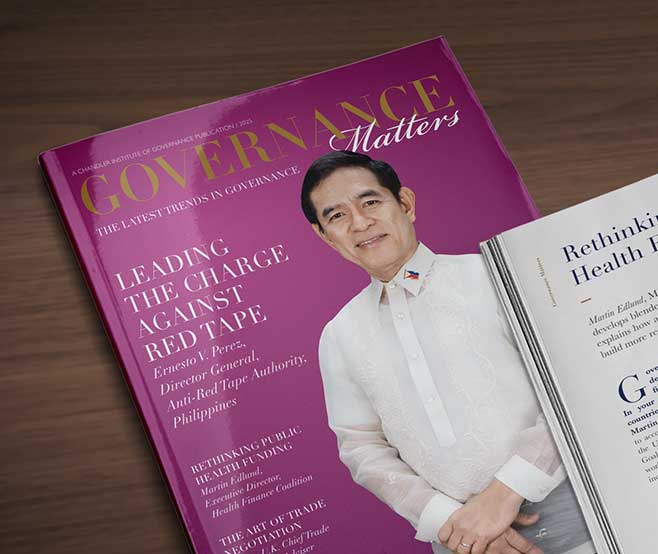Leading the Charge Against Red Tape
Formed under a landmark law to make public services faster, simpler, and more accountable, the Philippines’ Anti-Red Tape Authority (ARTA) has a unique mandate: to help government agencies improve how they serve the public, and to hold them accountable when they do not. Its Director General Ernesto V. Perez spoke to Governance Matters about how that mix of empowerment and enforcement is speeding up business approvals, curbing corruption through digitalisation, and giving citizens the power to demand faster, more transparent public services.
Lorem ipsum dolor sit amet, consectetur adipiscing elit, sed do eiusmod tempor incididunt ut labore et dolore magna aliqua. Ut enim ad minim veniam, quis nostrud exercitation ullamco laboris nisi ut aliquip ex ea commodo consequat. Duis aute irure dolor in reprehenderit in voluptate velit esse cillum dolore eu fugiat nulla pariatur.
Heading 1
Heading 2
Heading 3
Heading 4
Heading 5
Heading 6
Lorem ipsum dolor sit amet, consectetur adipiscing elit, sed do eiusmod tempor incididunt ut labore et dolore magna aliqua. Ut enim ad minim veniam, quis nostrud exercitation ullamco laboris nisi ut aliquip ex ea commodo consequat. Duis aute irure dolor in reprehenderit in voluptate velit esse cillum dolore eu fugiat nulla pariatur.
Block quote
Heading 6
Ordered list
- Item 1
- Item 2
- Item 3
Unordered list
- Item A
- Item B
- Item C
Bold text
Emphasis
Superscript
Subscript
Governance Matters: ARTA was established in 2018 to implement the Ease of Doing Business Act, which aims to streamline government processes, cut red tape, and improve how businesses and citizens interact with the government. What is its mission?
Ernesto V. Perez: ARTA promotes bureaucratic efficiency and good governance by streamlining and digitalising government processes and services. In our experience, this has been one of the most effective ways to reduce red tape and combat corruption.
The main challenges we encounter in our work are bureaucratic hurdles, such as the tendency of some, or even most, regulatory agencies to operate in silos. To change that mindset within government agencies, it is important to emphasise that this approach is no longer acceptable. Some individuals in government still cling to outdated regulations and requirements. There is little willingness to let go of these unnecessary demands, often because those individuals want to protect their turf and justify their agency’s existence. Changing that mindset within government agencies is one of our most important tasks.
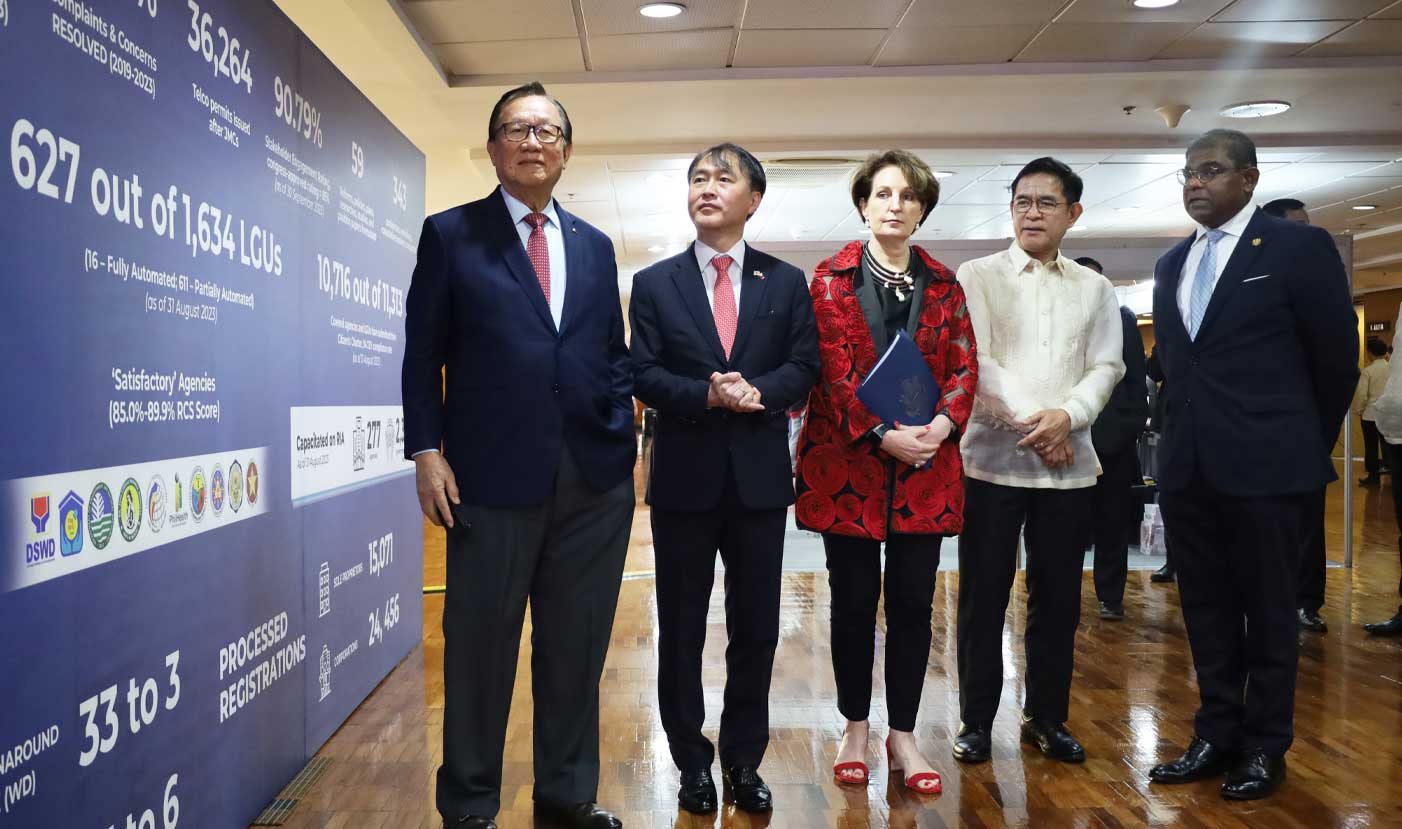
ARTA works with public agencies to improve service delivery and enforces compliance when agencies fail to meet required standards. What is the value of that dual mandate?
The empowerment function involves both training and capacity-building within agencies to help them comply with the Ease of Doing Business Act. It is implemented by our Operations Group, which is headed by a Deputy Director General for Operations.
Our enforcement mandate is to implement and enforce that law, to subject violators of the law to investigation, and to file charges if necessary.
We are the only agency that has this kind of authority. I see this dual mandate as a strength. It means we can call on covered agencies to interconnect, coordinate, and propose policies, particularly in situations where a single application is covered by multiple agencies. At the same time, we refer complaints against government officials or employees under the Ease of Doing Business Act to the Civil Service Commission, the Office of the Ombudsman, or the appropriate court. We have the mandate to interconnect these agencies to establish joint processes, which expedite the processing of applications.
The best way to fight red tape and corruption is by streamlining and digitalising all government services.
Digitalisation plays an increasingly important role in improving government service delivery. How does ARTA use digital platforms to enhance government efficiency and enforce compliance within government?
One of our most effective initiatives has been the implementation of the electronic Business One-Stop Shop (eBOSS), which all local government units (LGUs) are required by law to establish.
The eBOSS enables an end-to-end digital process for business permit applications, including submission of requirements, payment of fees, and issuance of permits. We believe that an LGU must be able to issue a permit in a matter of hours, or no more than a day, to be considered business-ready.
This remains our strongest proof that the best way to fight red tape and corruption is by streamlining and digitalising all government services.
As of July 2025, we have 130 LGUs that are already operational with eBOSS platforms. In all of those LGUs, there has been a substantial increase in business registrations and revenue collection. When people realise it is easier to deal with the government, they will voluntarily register their business and pay the correct amount, especially because digital permits are issued with QR codes, which makes verification simple and tamper-proof.
Knowing this, business owners are more likely to comply because otherwise, they will be easily caught.
On the enforcement side, ARTA has issued more than 400 notices to LGUs that failed to comply. Many responded and improved. But 117 ignored our notices, and in those cases, we filed charges with the Office of the Ombudsman.
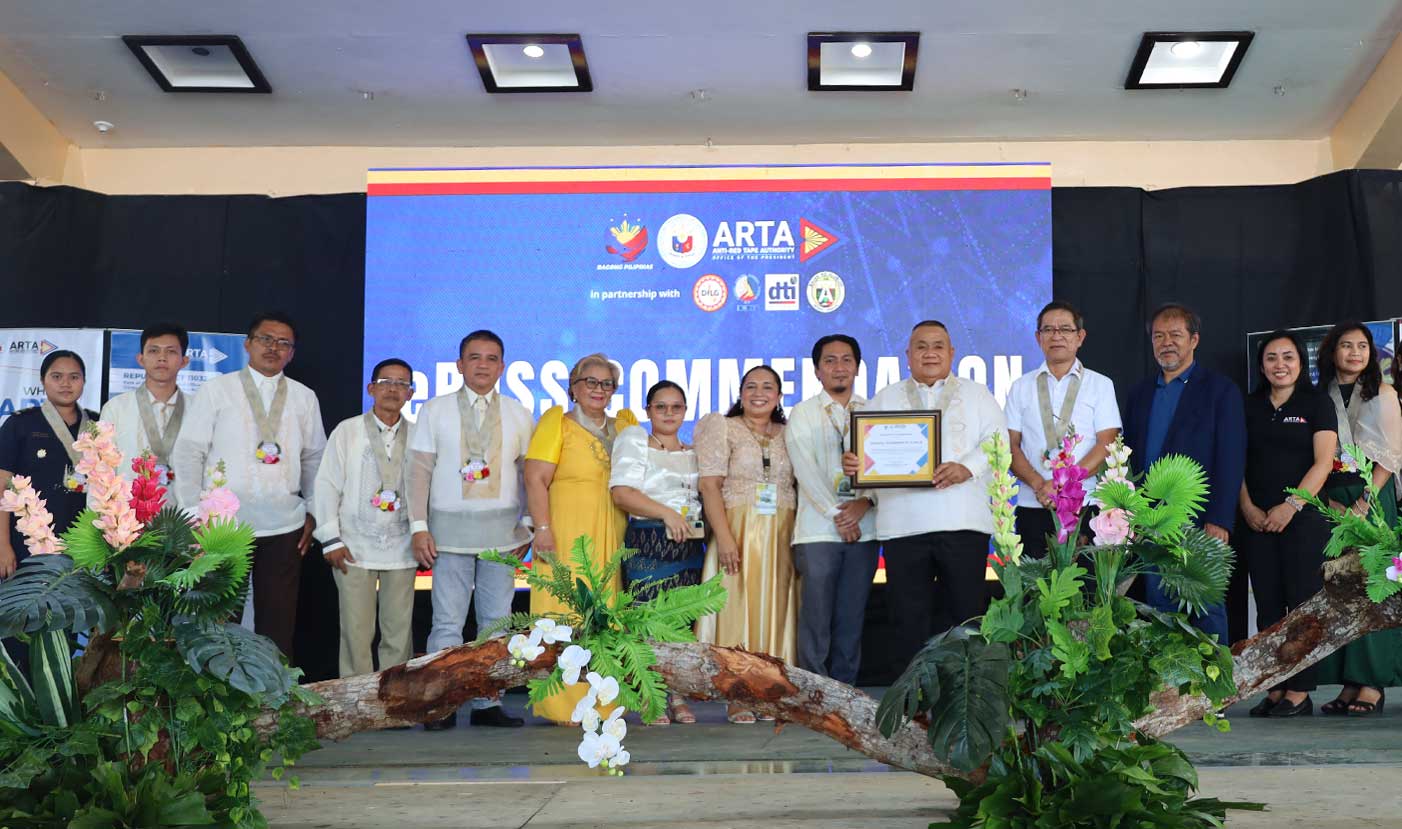
Starting a business is a complex, time-consuming process in many countries. How did ARTA’s Central Business Portal seek to address that problem?
The most frequent complaint we received about the business registration process, from both business owners and investors, was that it was overly complex and time-consuming. The Central Business Portal is implemented by the Department of Information and Communications Technology and ARTA. It functions as a one-stop online platform designed to simplify and automate the registration process for both corporations and sole proprietorships.
The significant impact of the portal clearly shows that when government procedures are streamlined and made accessible through digital platforms, more entrepreneurs are willing to engage with the system. As with the eBOSS, one of the key challenges in terms of implementation has been securing the political will of participating agencies. ARTA remains committed to pushing for the full adoption of both digital platforms.
New regulations can inadvertently create problems for businesses even when they solve other issues. What is ARTA’s approach to preventing this?
As part of our empowerment work, we train agencies to carry out a Regulatory Impact Assessment, or RIA, before issuing any new regulation. This is a very important part of our mandate, which ensures that any proposed regulation does not create an undue burden for the agency or for the public.
One example involved the Food and Drug Administration (FDA), which increased fees for product registration by over 1,000% in December 2024. After complaints from stakeholders, we required the FDA to subject the regulation to a Regulatory Impact Assessment. They agreed not to implement the regulation until the assessment was completed, and ARTA had reviewed it.
Most stakeholders accept higher fees if applications are handled efficiently, but in this case, applicants were not receiving updates or answers to their questions. The FDA had misinterpreted the Ease of Doing Business Act’s Zero Contact Policy and treated it as a ban on follow-ups or explanation requests, and even refusing applicants entry to their office. We issued an advisory clarifying that the policy allows requests for updates and explanations, including how fees are calculated.

In the Philippines, every agency is required to publish a Citizen’s Charter, which sets out what services they provide and how long they should take. What measures can ensure that these charters are implemented effectively?
In simple terms, the Citizen’s Charter is a document that all covered agencies must display on their websites and in the most visible areas of their offices. It outlines the services they offer to the public, the requirements they impose, the fees to be paid, and the standard processing time expected. They are also required to classify their services as either simple, complex, or highly technical transactions.
When government procedures are streamlined and made accessible through digital platforms, more entrepreneurs are willing to engage with the system.
In such cases, the law provides for a standard processing time for agency transactions of three, seven, or 20 working days, respectively. To help agencies comply with the requirement to submit up-to-date charters, we conduct orientation and training sessions for government agencies. We also hold town hall meetings with all covered agencies, and relevant private sector stakeholders such as the Chambers of Commerce.
The law clearly states that an agency must act on pending applications within the prescribed processing time, once all requirements have been submitted and fees have been paid. If the agency fails to do so, and proper proof is submitted to us, ARTA has the mandate to intervene. In such cases, we order the agency to approve new applications or renew existing ones.
To me, public engagement through initiatives such as Citizen’s Charters is very important, because it is a realisation of our mandate to promote transparency and accountability in government services.
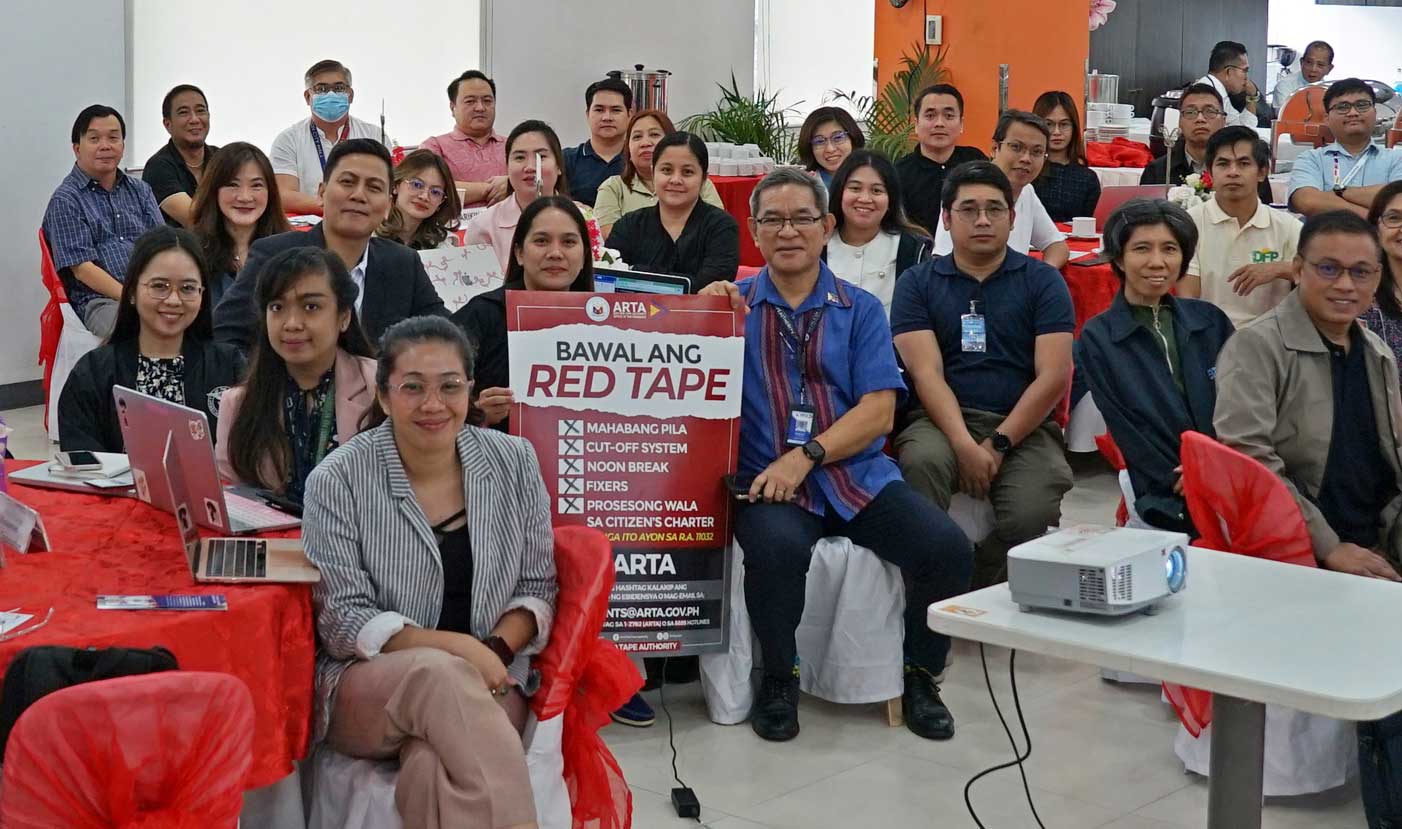
What have partnerships with other countries and the private sector allowed you to accomplish?
Being a relatively young agency with limited resources, we could not have accomplished everything without the support of our development partners and the private sector.
For example, the U.K. government provided us with technical assistance to develop what we now call the Whole-of-Government Reengineering Manual. This manual serves as a guide for agencies in simplifying and streamlining their internal processes.
The U.S. Agency for International Development (USAID) was also a key partner. With their support, we were able to develop important digital tools – such as the Philippine Business Regulations Information System (PBRIS), a platform where all agencies can upload their regulations for public access; and the Anti-Red Tape Electronic Management Information System (ARTEMIS), an online platform for submitting and monitoring Citizen’s Charters.
We also have strong partnerships with the private sector. Through our ARTA Champions, we work closely with both local and international chambers of commerce. This allows us to receive feedback directly from businesses and resolve complaints faster and more effectively.
There is growing interest in applying artificial intelligence (AI) beyond the private sector, including in public service delivery. How is your agency exploring or using AI to improve government services?
We know that the volume of complaints we receive will only grow as public awareness of ARTA continues to grow. That is why we are now in the process of implementing the Electronic Complaint Management System (eCMS), which will enable our Legal Group to receive complaints 24/7. And here, the use of AI will be critical. AI will allow us to track the status and progress of every complaint we receive and help us manage these in real time. That is one reason our Legal Group has a very high resolution rate of around 99.3%. AI is no longer optional for an agency such as ARTA.
What are ARTA’s priorities for the year ahead?
One of our major ongoing initiatives is Project NEHEMIA. This project aims to reduce permit processing time by at least 52% in key sectors. We have already made progress in the agriculture, pharmaceuticals, and housing sectors. This year, we are focusing on responsible mining, water systems, and semiconductors.
Another important effort is the Report Card Survey (RCS 2.0). This is a tool we use to evaluate how well agencies deliver their services, based on direct feedback from the public, and conducted by an independent third party to ensure objectivity. Last year, we piloted the survey with 50 agencies. In 2025, we expanded it to cover 860 agencies, and will publish the results in October. In 2026, we plan to further expand the coverage.
We also launched the Philippine Ease of Doing Business Reform Guidebook. This is a long-term plan, developed in consultation with government and private sector stakeholders. Our goal is to improve the Philippines’ competitiveness and bring us into the top 20% of countries in the World Bank’s annual “Business Ready” report. We want to send a clear message: the Philippines is ready for business.

Heading 1
Heading 2
Heading 3
Heading 4
Heading 5
Heading 6
Lorem ipsum dolor sit amet, consectetur adipiscing elit, sed do eiusmod tempor incididunt ut labore et dolore magna aliqua. Ut enim ad minim veniam, quis nostrud exercitation ullamco laboris nisi ut aliquip ex ea commodo consequat. Duis aute irure dolor in reprehenderit in voluptate velit esse cillum dolore eu fugiat nulla pariatur.
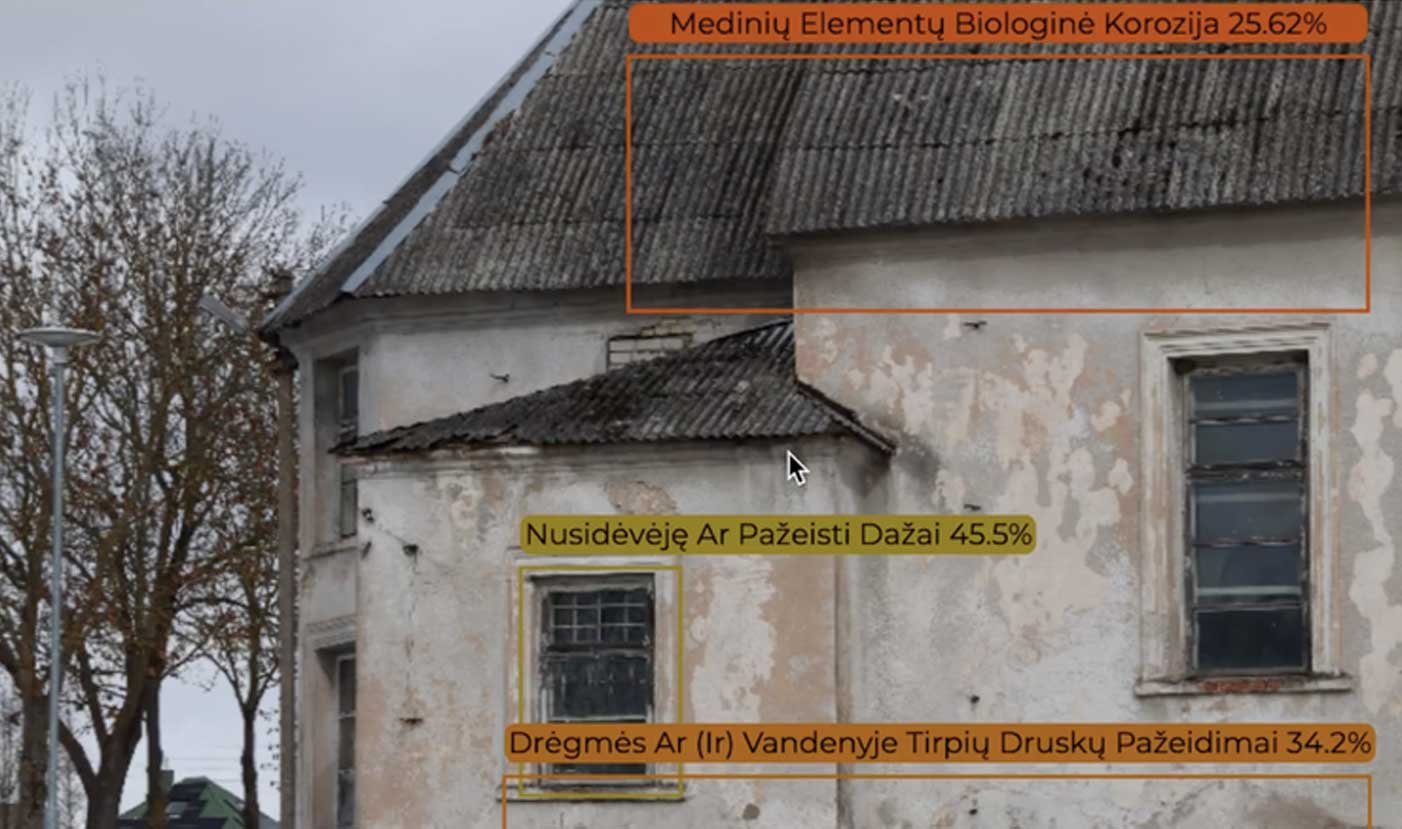
Block quote
Ordered list
- Item 1
- Item 2
- Item 3
Unordered list
- Item A
- Item B
- Item C
Bold text
Emphasis
Superscript
Subscript
Lorem ipsum dolor sit amet, consectetur adipiscing elit, sed do eiusmod tempor incididunt ut labore et dolore magna aliqua. Ut enim ad minim veniam, quis nostrud exercitation ullamco laboris nisi ut aliquip ex ea commodo consequat. Duis aute irure dolor in reprehenderit in voluptate velit esse cillum dolore eu fugiat nulla pariatur.
Endnotes
- Item 1
- Item 2
- Item 3


Ernesto V. Perez is the Director General of the Anti-Red Tape Authority (ARTA), a role he has held since November 2022. A seasoned public servant and reform advocate, he previously served as ARTA’s founding Deputy Director General and held key roles at the Department of Trade and Industry. An Ateneo Law School graduate and licensed Certified Public Accountant, he brings decades of legal and regulatory experience, academic leadership, and civic involvement to his mission of streamlining public service delivery in the Philippines.
Lorem ipsum dolor sit amet, consectetur adipiscing elit, sed do eiusmod tempor incididunt ut labore et dolore magna aliqua. Ut enim ad minim veniam, quis nostrud exercitation ullamco laboris nisi ut aliquip ex ea commodo consequat. Duis aute irure dolor in reprehenderit in voluptate velit esse cillum dolore eu fugiat nulla pariatur.






